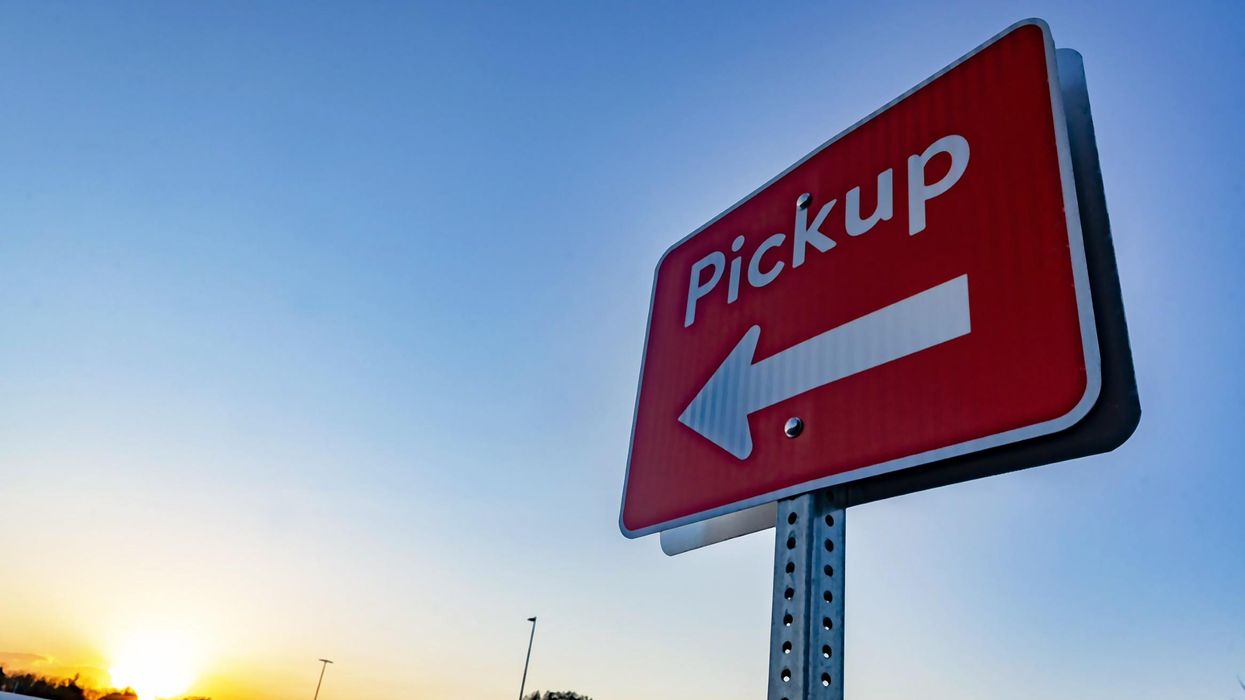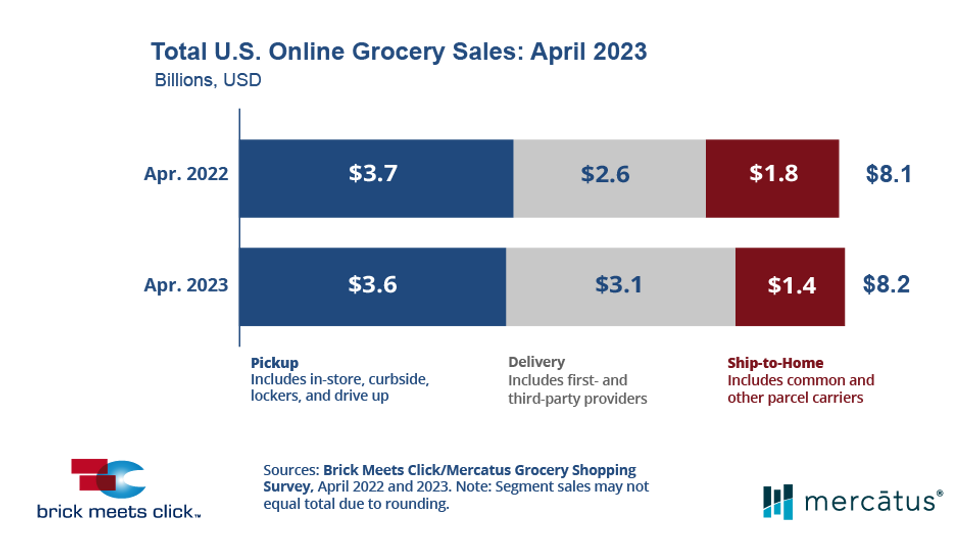Shopper Experience
15 May 2023
Egrocery sales rise in April, but there are big red flags
The gap in repeat intent between mass retailers and grocery set a new record, Brick Meets Click and Mercatus found.

(Photo courtesy of Walmart)
The gap in repeat intent between mass retailers and grocery set a new record, Brick Meets Click and Mercatus found.

(Photo courtesy of Walmart)
A boost in eGrocery sales was driven by a growing preference for mass retailers like Walmart and Target, according to new data.
The April 2023 edition of the Brick Meets Click/Mercatus Grocery Shopping Survey showed:
eGrocery sales totaled $8.2 billion for April 2023, rising 0.9% from April 2022.
Online’s share of total grocery spending fell in April. It was down 20 basis points to 12.1% when compared to last year.

While delivery gained, pickup and ship-to-home use fell. (Image via Brick Meets Click/Mercatus)
There was significant divergence among the three primary fulfillment categories. Delivery sales were up 20%. Meanwhile, pickup was down 3%, and ship-to-home fell 19%.
Digging deeper into key metrics yields the reason why this happened. In delivery, the monthly active user base grew 11% from a year ago, and was up 1% on a two-year basis. The average order value also rose 5%.
In pickup, the monthly active user base also grew in the “mid-single digits," according to the report. However, the category also saw a lower order frequency, while average order volume fell.
The biggest point of interest in this month’s findings for grocers comes in the area of repeat intent.
The likelihood that a customer will use the same service within the next 30 days fell 530 basis points compared to last year. This was a decline to just under 58%. In particular, the most precipitous drop came among the most frequent customers, who completed 4+ orders in the last three months.
Most importantly, there’s also a huge gulf in the intent to repeat between grocery and mass retailers. Both saw declines, but at a different scale. Grocery fell 900 basis points, while mass retail was down 300 basis points. It’s the biggest gap between the two categories recorded by the survey, surpassing the previous record set in January of this year.
The issues for grocery appear when one digs down into fulfillment methods. Delivery for grocery orders fell significantly compared to mass. That’s important because delivery is a much higher share of online orders in grocery than it is in mass.
The findings are a major warning sign for grocers.
“Given that customers vote with their wallet, the expanding gap in repeat intent between mass and grocery should be a red flag that warrants grocers re-evaluate all aspects of the customer experience,” said Sylvain Perrier, president and CEO of Mercatus, in a statement. “Customers’ expectations continue to evolve based on past experiences, which means it’s vital that grocers continue to improve the execution of various aspects, whether that’s a more personalized experience, fewer out-of-stocks, or shortened wait times.
It’s worth noting that these trends are coming at a time when rising prices have put particular pressure on consumers shopping for food. Over the last year, food at home has consistently been among the top categories experiencing dramatic levels of inflation. As a result, consumers have sought stores with lower prices. There are signs that this is changing behavior. Walmart is gaining higher-income consumers that may not normally shop there. While grocery delivery may be another area that sees pullback, the findings suggest that consumers are choosing not just how they shop, but where they shop for essentials, as well.
Campbell Soup Company CEO Mark Clouse offered thoughts on messaging amid inflationary shifts in consumer behavior.
After months of elevated inflation and interest rate hikes that have the potential to cool demand, consumers are showing more signs of shifting behavior.
It’s showing up in retail sales data, but there’s also evidence in the observations of the brands responsible for grocery store staples.
The latest example came this week from Campbell Soup Company. CEO Mark Clouse told analysts that the consumer continues to be “resilient” despite continued price increases on food, but found that “consumers are beginning to feel that pressure” as time goes on.
This shows up in the categories they are buying. Overall, Clouse said Campbell sees a shift toward shelf-stable items, and away from more expensive prepared foods.
There is also change in when they make purchases. People are buying more at the beginning of the month. That’s because they are stretching paychecks as long as possible.
These shifts change how the company is communicating with consumers.
Clouse said the changes in behavior are an opportunity to “focus on value within our messaging without necessarily having to chase pricing all the way down.”
“No question that it's important that we protect affordability and that we make that relevant in the categories that we're in," Clouse said. "But I also think there's a lot of ways to frame value in different ways, right?”
A meal cooked with condensed soup may be cheaper than picking up a frozen item or ordering out. Consumers just need a reminder. Even within Campbell’s own portfolio, the company can elevate brands that have more value now, even if they may not always get the limelight.
The open question is whether the shift in behavior will begin to show up in the results of the companies that have raised prices. Campbell’s overall net sales grew 5% for the quarter ended April 30, while gross profit margins held steady around 30%. But the category-level results were more uneven. U.S. soup sales declined 11%, though the company said that was owed to comparisons with the quarter when supply chains reopened a year ago and expressed confidence that the category is seeing a longer-term resurgence as more people cook at home following the pandemic. Snacks, which includes Goldfish and Pepperidge Farm, were up 12% And while net sales increased overall, the amount of products people are buying is declining. Volumes were down 7%.
These are trends happening across the grocery store. Campbell is continuing to compete. It is leading with iconic brands, and a host of different ways to consume them. It is following that up with innovation that makes the products stand out. Then, it is driving home messaging that shows consumers how to fit the products into their lives, and even their tightening spending plans.
Campbell Soup is more than 150 years old, and has seen plenty of difficult economic environments. It is also a different business today, and will continue to evolve. At the end of the day, continued execution is what’s required.
“If it's good food, people are going to buy it, especially if it's a great value,” Clouse said.